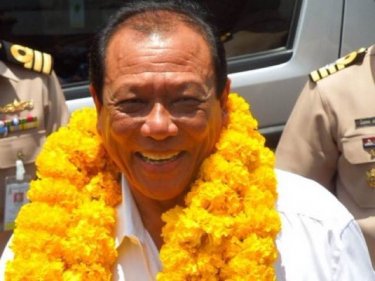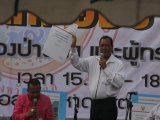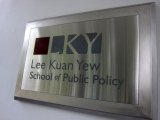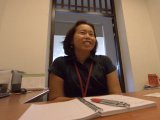It will be a day of reckoning, a moment of great significance.
Phuketwan has interviewed both the Keesins at different times over the past seven years. Both of them know all the rumors and the gossip that has swirled through Patong about them, and from time to time been reported publicly.
On one occasion when Khun Pian was still mayor he was, it could reasonably be said, probably as close as anyone has come to being master of the island.
A Phuketwan reporter asked him a simple question: ''Who is the real mafia?''
Mayor Pian responded: ''The government officers and the political people. They need their cash injections, like Vitamin C.''
Most of the conversation after that was off the record, but it was not a conversation likely to be forgotten.
Phuketwan's reporters also attended a meeting at Pisona Group HQ shortly after Prab Keesin took charge of a large number of tuk-tuk drivers in Patong.
The tuk-tuk drivers were unruly. Violence was becoming a problem. The police could not control them.
And so, as often happens on Phuket, the people in authority, the people who should be able to fix the problem themselves, look for help. In this case, it was one of the Keesins.
We sat through the meeting at Pisona and got a sense that the organisational structure that was being introduced was sensible and there was nothing sinister. It was quite a mundane article.
Other meetings with the Keesins have not been so dull. In an interview with Phuketwan in December, 2010, here's what Prab Keesin had to say about corruption:
WHEN WE talk about corruption in Patong, we have to talk about the whole world. Every country has it the same. Between business and the law, they work together. There is give and take. Patong is Patong. Police do not accept drugs. The thing is 50-50 between business and government. They do not allow bad things. I think it is bad, but sometimes we have to understand. The city is changing, but the law is very old. We need to have income for education, good health, and generally, corruption is not too bad. But we do not want more. We should change the law to avoid corruption. It's like a secret. Nobody knows who takes the money. Nobody knows the exact number. It has happened for 200 years already. The corruption in Patong is like a ghost: never seen, but we know it's there.
Oh yes, it's there all right. A couple of months before we interviewed Prab Keesin, there was a public meeting in Patong, called by his father, the mayor. The gathering took place on the field opposite Loma Park.
The word got around in advance and reached Phuketwan: more government people were putting the squeeze on Patong. They're getting too greedy.
Here's how it was reported:
THE FULL EXTENT of corruption on Phuket was revealed today when the head of Patong's entertainment association said that local venues were prepared to continue to make corrupt payments to 14 government offices and branches - but that was enough.
Requests from three additional government bodies to also gain under the table payments have the Phuket venues throwing up their hands saying, in effect: ''We can tolerate corruption, but anything beyond 14 organisations is just plain greedy.''
After the meeting, in response to a question from Phuketwan, Weerawit Kuresombut, President of the Entertainment Association in Patong, told us a few details. Corrupt payments, it appears, are always made in cash and usually recorded in account books as ''rent.''
The system is widely understood and tolerated on Phuket because in the end, it's the tourists who pay.
The identities of the 14 government bodies that form part of the entrenched system of corruption on Phuket have never been revealed. Dare we ask, what would happen if they were?
Last year, both the Keesins were on the ''mafia'' list provided by the Department of Special Investigation when DSI officers descended on Phuket to make a half-hearted attempt to tame the taxi and tuk-tuk drivers.
That attempt sputtered to a halt after both Khun Prab and his father made the same point: ''Who is corrupt, the person who pays the bribe or the person who takes it?''
What a question.
Soon after the 2010 interview with Khun Prab, Phuketwan travelled to Singapore for a revealing series of interviews with Ora-orn Poocharoen, the Assistant Dean for Student Affairs at the well-regarded Lee Kuan Yew School of Public Policy. We asked her how Phuket could learn from Singapore's solution to corruption and end the Thai holiday island's graft.
That series remains just as valid today. Now more than ever, with the military running Thailand, there's a real chance to bring about Phuketwan's frequently-expressed aim of making Phuket a corruption-free role model for the rest of the country.
As Ajarn Ora-orn told us: ''In Singapore they were not reluctant to put people, top ranking people, in jail one after the other - bom-bom-bom - to show the public that this is serious, the law is enforceable, and to me it's a strategy of catching the big fish. You don't waste time to catch people for petty corruption, you just go for the top. Go for the highest.
''Don't waste your time on small cases. That would be my recommendation for Phuket. Focus on that, keep on reporting that, keep on investigating that, keep on shining light on that. Force the law to be enforceable.''
Yet like a dark monsoon season cloud, the Keesin's question continues to hang over their own investigation, and all of Phuket.
''Who is corrupt, the person who pays the bribe or the person who takes it?''
Prime Minister Gen Prayuth Chan-ocha is reported as saying that he knows the correct answer. He believes the honest answer is: ''Both.''
If that's the case, if the government seriously aims to beat corruption in all its forms, especially among the authorities, then it's time to throw open Pandora's Box.
Phuket and Thailand may be about to change in ways that were once so very hard to believe.











So, Ed - Do you not agree that the answer to ''Who is corrupt, the person who pays the bribe or the person who takes it?'' is "Both"?
Posted by phonus balonus on August 31, 2014 13:17
Editor Comment:
We never respond to loaded questions. They almost always begin with ''So . . . '' We believe in the inevitability of change and the need for (good) laws to be enforced.